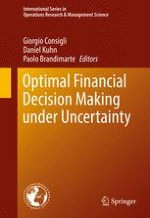2017 | OriginalPaper | Buchkapitel
8. Stabilizing Implementable Decisions in Dynamic Stochastic Programming
verfasst von : Michael A. H. Dempster, Elena A. Medova, Yee Sook Yong
Erschienen in: Optimal Financial Decision Making under Uncertainty
Aktivieren Sie unsere intelligente Suche, um passende Fachinhalte oder Patente zu finden.
Wählen Sie Textabschnitte aus um mit Künstlicher Intelligenz passenden Patente zu finden. powered by
Markieren Sie Textabschnitte, um KI-gestützt weitere passende Inhalte zu finden. powered by
